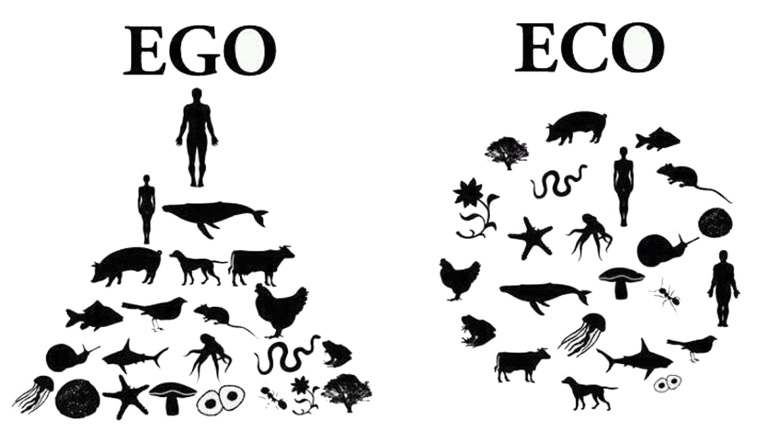 Deep Ecology is an approach to addressing environmental topics that go beyond being a mere theory or ethical system, it aims to ask questions that are not being asked and are more fundamental. The “deep” in deep ecology intends to explicitly imply the extensive analysis possible through this worldview. As compared to most of the past worldviews discussed in this blog, deep ecology appears as a holistic earth wisdom worldview that is non-anthropocentric and ecocentric. The central idea is to have us, human beings, not perceive the world as us and them, but rather as us in the environment. We should not approach issues concerning the environment and desires from a superior perspective—a hierarchal viewpoint. The prevalent worldview is structured by our capitalistic systems and constant demand for economic growth fueled by the constant consumption of material goods we are told should be desired. Most times those materialistic things are harmful to the environment, produce immense amounts of waste, and so on, which are desired and not necessarily needed. The act of desiring should entail a consideration for other living things since, from a Deep Ecological approach, we are part of nature and not something beyond it. From the bears in the forest to the tiny microbes that are found in the environment and even our bodies, it is vital to our existence to perceive all living things and to be aware of the consequences our actions have towards them. Deep ecology urges for biocentrism and for self-realization to extend beyond the capitalistic self and to entail the self as all living things in nature.
Deep Ecology is an approach to addressing environmental topics that go beyond being a mere theory or ethical system, it aims to ask questions that are not being asked and are more fundamental. The “deep” in deep ecology intends to explicitly imply the extensive analysis possible through this worldview. As compared to most of the past worldviews discussed in this blog, deep ecology appears as a holistic earth wisdom worldview that is non-anthropocentric and ecocentric. The central idea is to have us, human beings, not perceive the world as us and them, but rather as us in the environment. We should not approach issues concerning the environment and desires from a superior perspective—a hierarchal viewpoint. The prevalent worldview is structured by our capitalistic systems and constant demand for economic growth fueled by the constant consumption of material goods we are told should be desired. Most times those materialistic things are harmful to the environment, produce immense amounts of waste, and so on, which are desired and not necessarily needed. The act of desiring should entail a consideration for other living things since, from a Deep Ecological approach, we are part of nature and not something beyond it. From the bears in the forest to the tiny microbes that are found in the environment and even our bodies, it is vital to our existence to perceive all living things and to be aware of the consequences our actions have towards them. Deep ecology urges for biocentrism and for self-realization to extend beyond the capitalistic self and to entail the self as all living things in nature.

Arne Naess developed two standards or principles that should be applied in order to attain a deep ecological consciousness. The first principle is that of self-realization; the principle goes beyond the Western value of the self and embodies more so the idea of “no one is saved until we are all saved” (VV, 265). One refers to not just oneself, all humans, but all livings as far as including basic microorganisms. The second principle is biocentric equality that refers to every aspect in the biosphere maintains the equal right to self-realize in its own means of self-realization. In other words, in harming nature we are directly or indirectly harming ourselves since we are in fact in nature and not above it. The table, from The Environmental Ethics and Policy Book, describes the contrast between the dominant worldview and deep ecology:
| Dominant Worldview | Deep Ecology |
| Dominance over Nature
Natural environment as resource for humans
Material/economic growth for growing human population
Belief in ample resource reserves
High technological progress and solutions
Consumerism
Nation/centralized community |
Harmony with Nature
All nature has intrinsic worth/bio species equality
Elegantly simple material needs (material goals serving the larger goal of self-realization)
Earth “supplies” limited
Appropriate technology; non-dominating science
Doing with enough/recycling
Minority tradition/bioregion
|
The table contrasts the prevalent worldview compared to the more earth wisdom worldview of deep ecology. The dominant worldview reflects more so a shallow ecological approach rather than a focus on deep ecology. The dominant worldview intends to address immediate needs and desires, which is apparent in policies, the economy, technological advancements, etc., and intend to highlight the surface issues that is somewhat expressed through the term of “shallow” ecology. Moreover, deep ecology seeks to analyze the fundamental principles like for instance what is the criterion for moral standing. Moral standing is reflecting in Naess’s view on moral law, where he argues a moral law should not be merely followed out of one’s obligation with a negative inclination, but rather moral law should be followed with a positive inclination that transforms that moral act into what Immanuel Kant refers to as a beautiful act. The beautiful act reflects the notion that deep ecology seeks to address, and that is to reform our inclinations through a focus on the principle beliefs rather than simply relying on moral inclination. If one desires to consciously protect other life forms and the environment, then the result generates positive desires.
As a contrasting viewpoint to Deep Ecology, Andrew Weston, Andrew Light, and Eric Katz argue for Shallow Ecology through a lens of Environmental Pragmatism. Environmental Pragmatism is more so a shallow rather than deep ecology because the emphasis is placed on the values in shallow ecology—the practices, policies, and technologies; whereas, it acknowledges the importance of “deep” analysis of our fundamental beliefs. The emphasis is placed upon the need to have answers immediately for unavoidable issues and to move away from the more long term and more difficult approach of attempting to make everyone into deep ecologist, which would take many decades if not centuries. The economic system that drives most of our desire and needs, that which determines the value of everything, is a complex system that is so inherently present in our everyday lives—at least in the U.S. Environmental pragmatism demonstrates the practical usage of focus on the short-term acts. For instance, it is much simpler to attempt to change one simple aspect of everyone’s lifestyle that may be harmful to our environment versus seeking to change their whole attitudes. We are creatures of habit, for the most part, thus disrupting the beneficial or seemingly selfish system we have created, would inevitably be perilous and ineffective.
Shallow and Deep Ecology have the ability to be incorporated amongst addressing each particular concern, in which you would mainly focus on the short-term issues and slowly incorporate deep ecological views in society. In a way, if it is possible, we could address pressing environmental concerns through policy, technology, and so forth, and simultaneously attempt to act in a way that is sustainable and thus answer for the long-term that deep ecology seeks out. The main idea being we can address short-term issues with a consideration of the long term in order to provide meaningful and sustainable attitudes and acts for the environment.
Word Count: 1041
Discussion Question: The compromise between Shallow and Deep ecology is based on the idea that we can simultaneously make short-term acts that also reflect a change in beliefs. In an ideal environment this approach may be feasible; however, I am concerned whether what we deem as a short-term approach is adequate or even corresponding to the long-term desires? How can we know?
